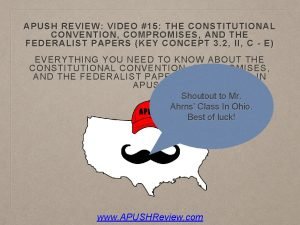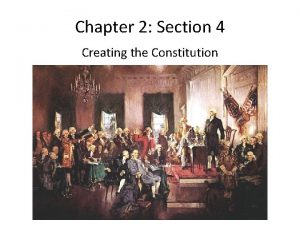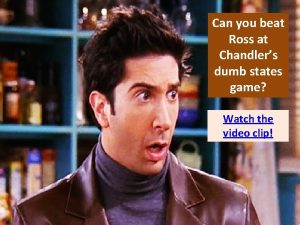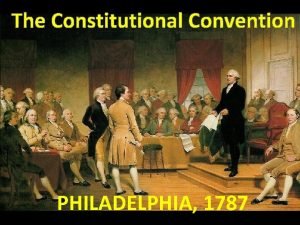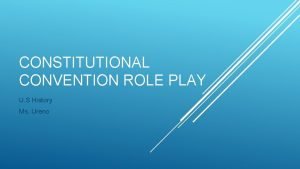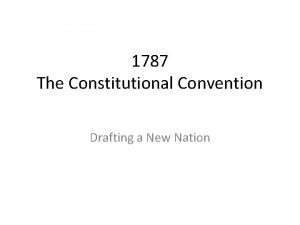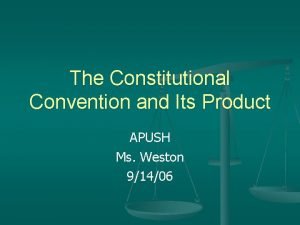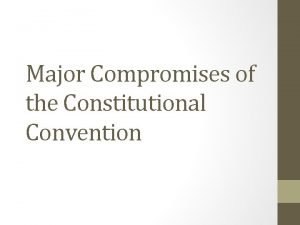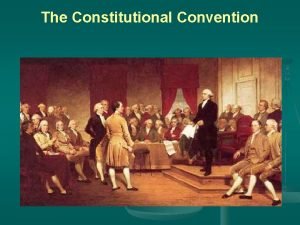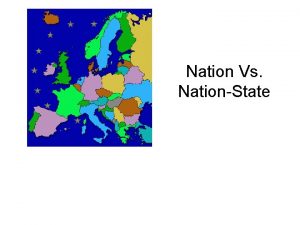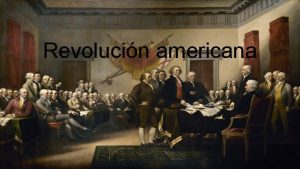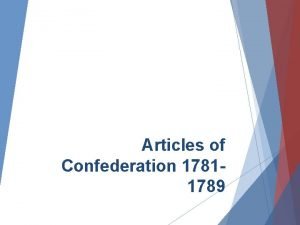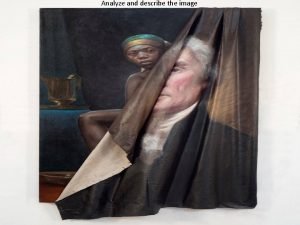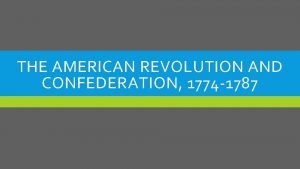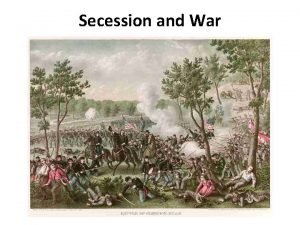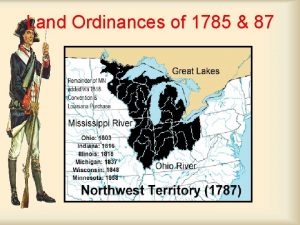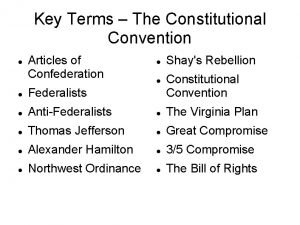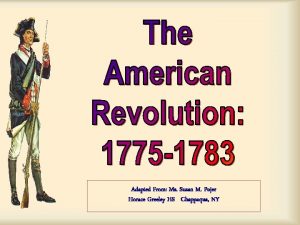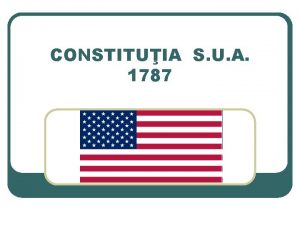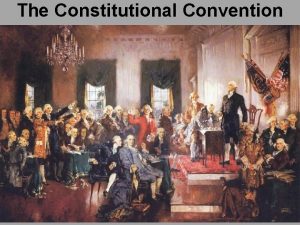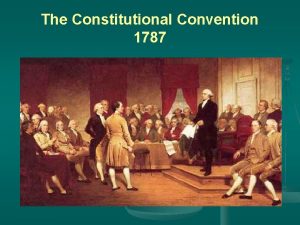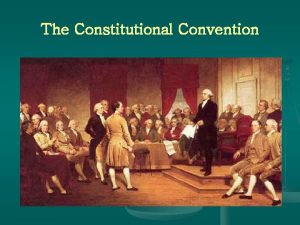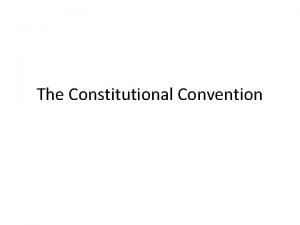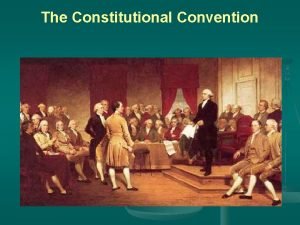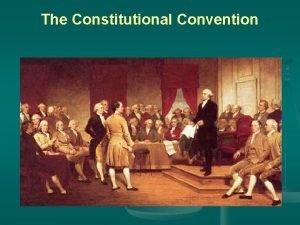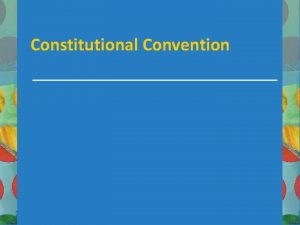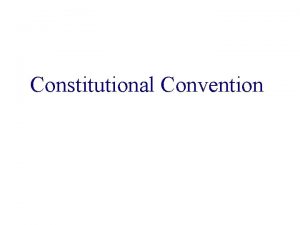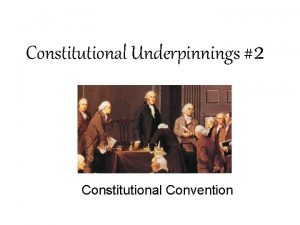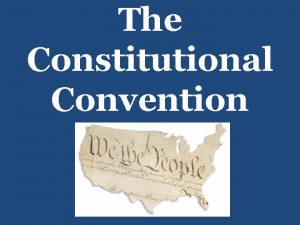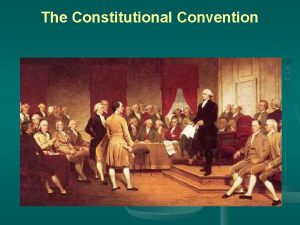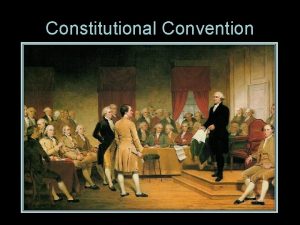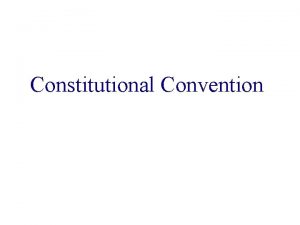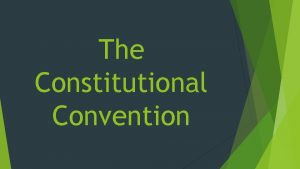Two PlansOne Nation Constitutional Convention Summer of 1787




























- Slides: 28

Two Plans…One Nation

Constitutional Convention • Summer of 1787 • Philadelphia • 55, white, male, mostly educated delegates • George Washington presided • James Madison authored basic plan • Ben Franklin added prestige

Opposing Plans Virginia Plan • Strong national government • Bicameral legislature • Chief executive • Court system • Proportional representation New Jersey Plan • Weak national government • Unicameral legislature • Executive branch • Equal representation

Compromise Great Compromise • Bicameral Legislature • House of Representatives 3/5 Compromise • Slaves counted as 3/5 for taxation and representation – Proportional to population • Slavery not addressed • Senate until 1808 – Equal representation






Constitution Based on: • Magna Carta (1215) • English Bill of Rights (1689) • Enlightenment (1700 s) • Two Treatises of Civil Government – John Locke (1690) • The Spirit of Laws (1748) – Baron de Montesquieu

Constitution Parts Principles • Preamble: Introduction • Articles – I: Legislative Branch – II: Executive Branch – III: Judicial Branch – IV: Relations among States – V: Amendment Process – VI: National Supremacy – VII: Ratification • Sections • Amendments • • • Popular Sovereignty Republicanism Limited Government Federalism Separation of Powers Checks and Balances • Individual Rights

Separation of Powers • Each of the three branches of government has its own responsibilities

Checks and Balances • Each branch of government holds some control over the other two branches

Individual Rights • Basic liberties and rights of all citizens are guaranteed in the Bill of Rights



Legislative Branch Senate House • • • • 100 Senators Represent state 30 yrs. Old 6 yr. term Approves treaties Confirms nominations • Passes legislation 435 Representatives Represent district 25 yrs. Old 2 yr. term Originates revenue bills Impeach federal officials Passes legislation

Executive Branch • Nominate members of the federal judiciary • Veto laws passed by Congress • Commander in Chief of military • Pardons and Reprieves • State of the Union • Recommend Legislation • Execute Laws (Dept. of Justice)

Judicial Branch • • District courts Appeals courts Supreme Court Judicial Review


Enumerated Powers (Delegated) • Regulate Trade • Coin Money Reserved Powers Concurrent Powers • Enforce Laws • Provide an Army & • Establish Courts Navy • Collect Taxes • Conduct Foreign • Borrow Money Affairs • Provide for • Set Up Federal General Welfare Courts • Regulate Trade w/in the State • Establish Local Government • Conduct Elections • Establish Public School Systems

Amending the Constitution Nationally Driven • Congress • 2/3 vote of both houses • ¾ of states State Driven • Constitutional Convention called by 2/3 of states • ¾ of states

Elastic Clause • Article 1, Section 8 • Congress shall “make all Laws which shall be necessary and proper” • Implied powers of the Congress


Amendments 1. Personal Rights & Freedoms 14. Former Slaves’ Rights 2. Right to Bear Arms 15. Right to Vote 3. Quartering of Troops 16. Allows Income Tax 4. Search & Seizure 17. Election of Senators 5. Rights of Accused 18. Prohibition 6. Right to Speedy Trial 19. Suffrage 7. Right to Trial by Jury 20. Lame Duck 8. No Cruel & Unusual Punishment 21. Repeal of Prohibition 9. Powers Reserved to People 22. Term Limits 10. Powers Reserved to States 23. District of Columbia 11. Limits Suits Between States 24. Abolition of Poll Tax 12. Election of President & Vice 25. Outlines Presidential Succession President 26. Lowers Voting Age 13. Abolition of Slavery 27. Limits Congressional Salaries


Federalists • Proposed strong central government

Anti-Federalists • Supported a weaker federal government and stronger state governments
 Constitutional convention 1787
Constitutional convention 1787 Great compromise apush
Great compromise apush Constitutional convention definition
Constitutional convention definition Constitutional convention definition
Constitutional convention definition Constitutional convention compromise
Constitutional convention compromise Va plan nj plan great compromise
Va plan nj plan great compromise Constitutional convention role play
Constitutional convention role play Constitutional convention cartoon
Constitutional convention cartoon Constitutional convention
Constitutional convention Constitutional convention apush
Constitutional convention apush Compromises at the constitutional convention
Compromises at the constitutional convention Constitutional convention begins
Constitutional convention begins Constitutional convention article 5
Constitutional convention article 5 Lesson 1 - the constitutional convention
Lesson 1 - the constitutional convention State vs nation
State vs nation Country vs nation
Country vs nation Nation vs state
Nation vs state French revolution calender
French revolution calender Independencia eeuu
Independencia eeuu Usa 1787
Usa 1787 Northwest ordinance of 1787
Northwest ordinance of 1787 Estates general
Estates general Northwest ordinance of 1787
Northwest ordinance of 1787 Northwest ordinance of 1787
Northwest ordinance of 1787 Northwest ordinance of 1787
Northwest ordinance of 1787 Northwest ordinance of 1787
Northwest ordinance of 1787 What is the northwest ordinance
What is the northwest ordinance Northwest ordinance of 1787
Northwest ordinance of 1787 Censitar
Censitar

